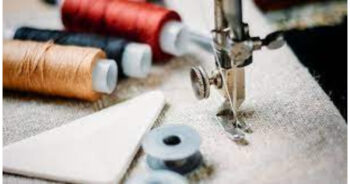 Academics at the University of Exeter and Wolverhampton University, in England, believe that by teaching people how to make, mend and modify garments, they’ll adopt more ‘sustainable’ clothing choices. During a nine-month study across both Cornwall and the West Midlands, participants took part in workshops in which they were shown how clothing is manufactured and are said to have responded well to practical sessions, more so than attempts to educate them, which they found “alienating” and “discouraging”.
Academics at the University of Exeter and Wolverhampton University, in England, believe that by teaching people how to make, mend and modify garments, they’ll adopt more ‘sustainable’ clothing choices. During a nine-month study across both Cornwall and the West Midlands, participants took part in workshops in which they were shown how clothing is manufactured and are said to have responded well to practical sessions, more so than attempts to educate them, which they found “alienating” and “discouraging”.
Dr. Joanie Willett, of the University of Exeter, commented: “We found the driving factor for avoiding fast fashion lies in realising clothing and the materials that it is made from are precious, and embody labour and time. After the workshops people expressed a desire to reduce their clothing either by buying fewer goods of better quality that they expected to be able to keep for longer or choosing not to buy anything at all for an extended time.”
Part of the Arts and Humanities Research Council’s ‘Designing a Sensibility for Sustainable Clothing’ project, the study explored people’s attitudes towards fashion and their understanding of how to repair a garment. Many of the participants in the West Midlands area are said to have previously worked in the garment manufacturing sector, and so had knowledge of various repair techniques.
Regardless of their level of skill, all participants took part in as many as 40 workshops where they were shown how garments are constructed and, comparatively, how items like a woollen jumper can be unravelled and used in the production of other items.
The workshop tasks were designed to get people to think about the life of clothing and their materials, the ethical questions raised by fast fashion, and teaching skills to make, mend and modify clothes.
Participants also took part in wardrobe edits at the beginning and end of their time taking part, during which they estimated the number of items in their wardrobes, before making an accurate count of the number of them.
This was done to help people understand the extent to which the average consumer’s clothing collection can grow and how these items can be reused, restyled and repaired. A key learning was not that ‘fast fashion is bad’, but that all materials hold value regardless of an item’s price point.
One participant commented: “We’ve had quite a few good chats about cheap clothing and not demonising it and the privilege of being able to clothe yourself adequately.” Another added: “I don’t think it’s about shaming people about what they buy, and going “that’s wrong”, I think it’s more about helping people make more informed decisions.”
Professor Clare Saunders, from the University of Exeter, said: “We found inviting people to immerse them in the materiality of clothing enabled potentially transformative affective encounters which like seeds, can be nurtured and fostered.
“The workshops supported participants to become more ‘fluent’ as people who create with textiles, and to find their enjoyment in undertaking these activities.”
 Academics at the University of Exeter and Wolverhampton University, in England, believe that by teaching people how to make, mend and modify garments, they’ll adopt more ‘sustainable’ clothing choices. During a nine-month study across both Cornwall and the West Midlands, participants took part in workshops in which they were shown how clothing is manufactured and are said to have responded well to practical sessions, more so than attempts to educate them, which they found “alienating” and “discouraging”.
Academics at the University of Exeter and Wolverhampton University, in England, believe that by teaching people how to make, mend and modify garments, they’ll adopt more ‘sustainable’ clothing choices. During a nine-month study across both Cornwall and the West Midlands, participants took part in workshops in which they were shown how clothing is manufactured and are said to have responded well to practical sessions, more so than attempts to educate them, which they found “alienating” and “discouraging”.












